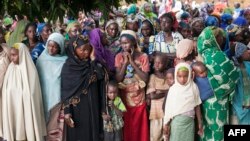Fifty-thousand people from the Central African Republic live at the Garoua Boulaye refugee camp in eastern Cameroon. Some have been there since conflict in the C.A.R. erupted in 2013.
The election of Faustin Archange Touadera as C.A.R. president earlier this year looked like a turning point. After he was inaugurated, refugees in Cameroon said they started preparing to return home.
But those preparations have stopped. The U.N. refugee agency recently organized a voluntary relocation exercise. Only 3 percent of the refugees accepted the chance to go back to the C.A.R.
Refugee Bienvenue Touadera, 54, said there is no peace in his homeland, and that even if peace had returned, the decision to go back should be individual. He said authorities in his country have not been making decisions that would help reintegrate people like him who lost everything in the war.
Ekodo Yannick, president of an association for Central African university students in Cameroon, said many of them plan to seek greener pastures in developed countries.
He said many students prefer to ask international agencies like the UNHCR to negotiate with families that could agree to host them in developed countries like Canada and the United States, where they could get jobs, instead of returning to the C.A.R. where there is a lot of disorder. He said many of them have lost their families and will not accept returning and suffering.
In all, Cameroon hosts 300,000 refugees from the C.A.R.
Uprising in 2013
Rebels overthrew the government in Bangui in 2013, and efforts to unseat the rebels later tipped the country into sectarian conflict. Fighting continues to flare up in the capital and other parts of the country.
This week, the U.N. human rights chief said he feared “a re-escalation of violence in coming months.”
Cameroonian officials say tensions are also mounting near the border between host communities and refugees.
Manga Thimothe Bel, who works at the refugee camp at Garoua Boulaye, said most refugees are refusing to return home; they note that if peace had returned, the military would not need to escort the vehicles transporting humanitarian assistance to their country. He also said that the host population has been complaining that the refugees are responsible for the kidnappings for ransom and highway robberies in Garoua Boulaye.
Jose Katunda, head of the UNHCR office in the Cameroonian town of Meiganga, said conditions for refugees need to improve.
He said it's imperative for the governments of Cameroon and the Central African Republic and the U.N. refugee agency to sit down and discuss the future of the refugees and agree on the conditions under which the refugees can return home if they want. He said there should be a political will to help refugees rebuild their lives.
The question is: Will the refugees want to rebuild their lives in the C.A.R.?




